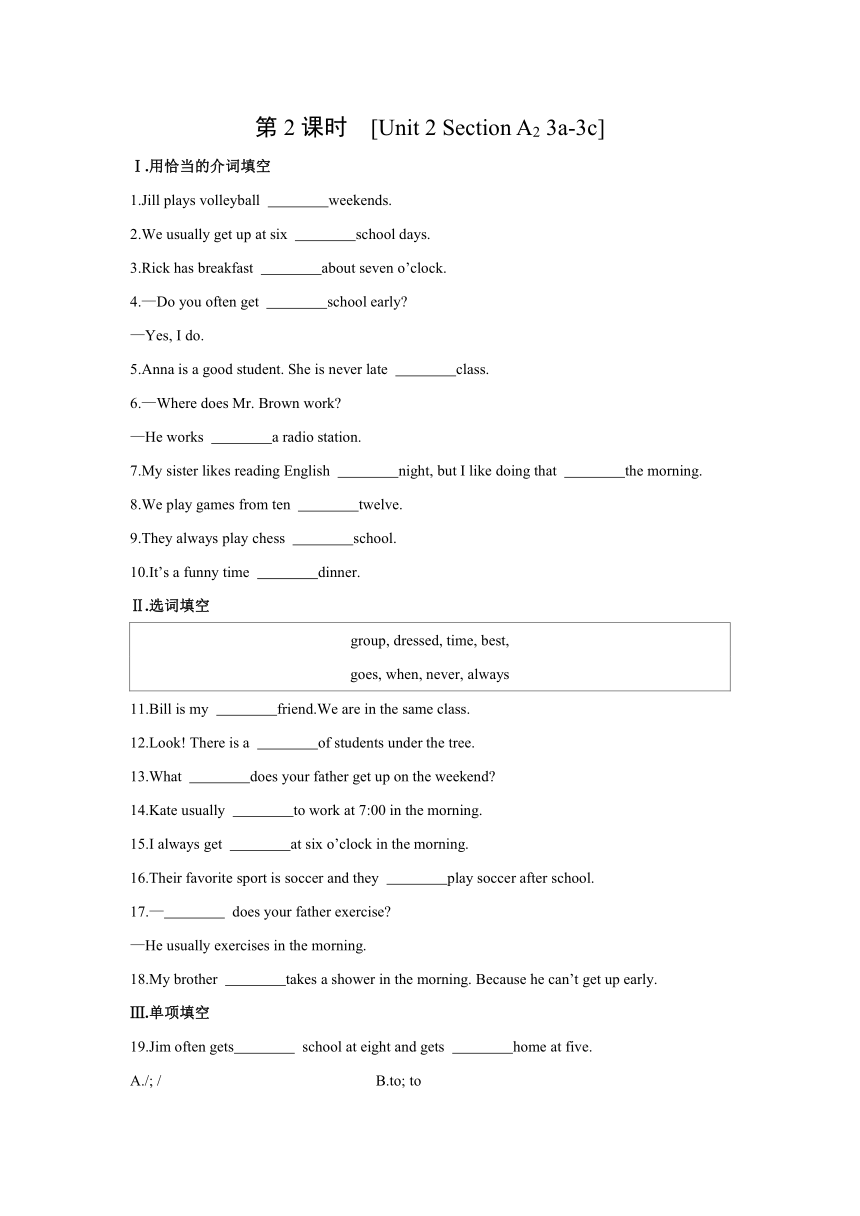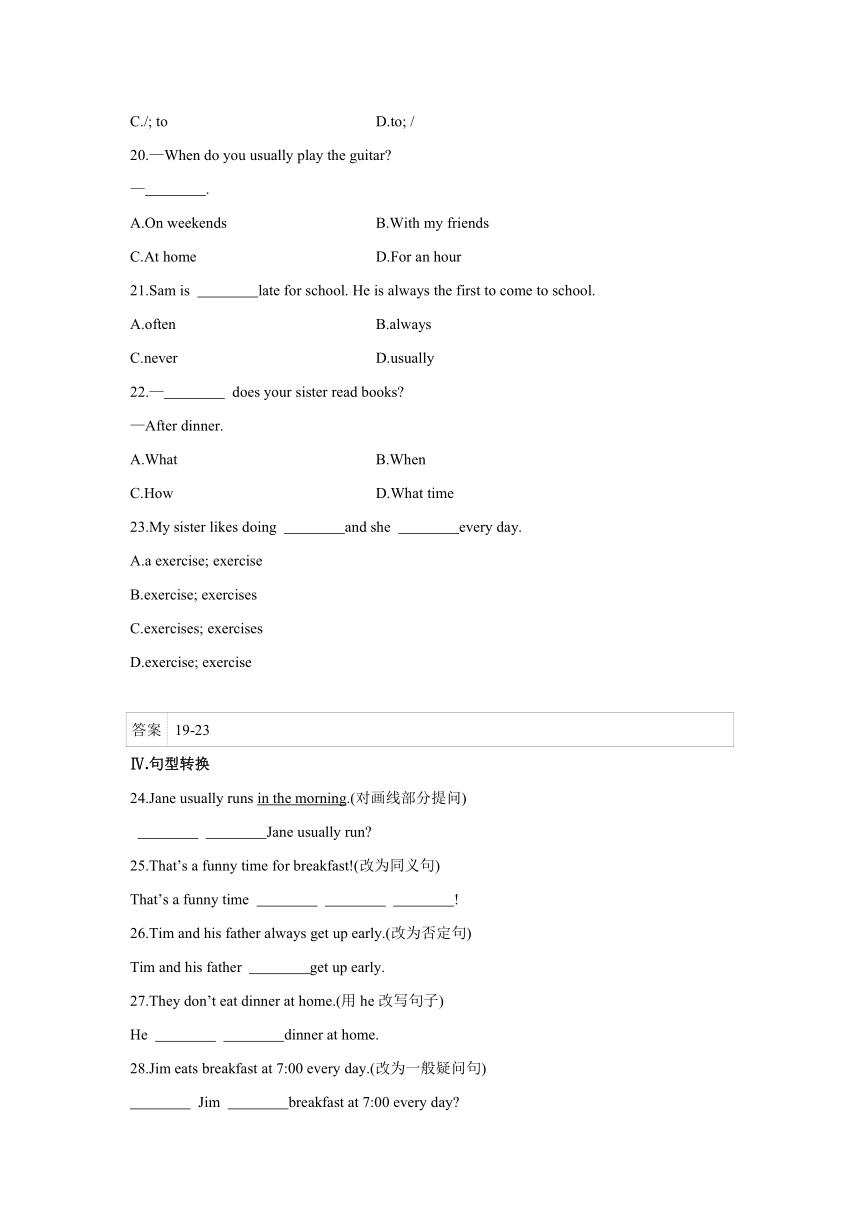人教版英语七年级下册 Unit 2 What time do you go to school? Section A(3a-3c)课课练(含答案)
文档属性
| 名称 | 人教版英语七年级下册 Unit 2 What time do you go to school? Section A(3a-3c)课课练(含答案) |  | |
| 格式 | docx | ||
| 文件大小 | 43.6KB | ||
| 资源类型 | 教案 | ||
| 版本资源 | 人教新目标(Go for it)版 | ||
| 科目 | 英语 | ||
| 更新时间 | 2022-07-13 13:38:33 | ||
图片预览


文档简介
第2课时 [Unit 2 Section A2 3a-3c]
Ⅰ.用恰当的介词填空
1.Jill plays volleyball weekends.
2.We usually get up at six school days.
3.Rick has breakfast about seven o’clock.
4.—Do you often get school early
—Yes, I do.
5.Anna is a good student. She is never late class.
6.—Where does Mr. Brown work
—He works a radio station.
7.My sister likes reading English night, but I like doing that the morning.
8.We play games from ten twelve.
9.They always play chess school.
10.It’s a funny time dinner.
Ⅱ.选词填空
group, dressed, time, best,
goes, when, never, always
11.Bill is my friend.We are in the same class.
12.Look! There is a of students under the tree.
13.What does your father get up on the weekend
14.Kate usually to work at 7:00 in the morning.
15.I always get at six o’clock in the morning.
16.Their favorite sport is soccer and they play soccer after school.
17.— does your father exercise
—He usually exercises in the morning.
18.My brother takes a shower in the morning. Because he can’t get up early.
Ⅲ.单项填空
19.Jim often gets school at eight and gets home at five.
A./; / B.to; to
C./; to D.to; /
20.—When do you usually play the guitar
— .
A.On weekends B.With my friends
C.At home D.For an hour
21.Sam is late for school. He is always the first to come to school.
A.often B.always
C.never D.usually
22.— does your sister read books
—After dinner.
A.What B.When
C.How D.What time
23.My sister likes doing and she every day.
A.a exercise; exercise
B.exercise; exercises
C.exercises; exercises
D.exercise; exercise
答案 19-23
Ⅳ.句型转换
24.Jane usually runs in the morning.(对画线部分提问)
Jane usually run
25.That’s a funny time for breakfast!(改为同义句)
That’s a funny time !
26.Tim and his father always get up early.(改为否定句)
Tim and his father get up early.
27.They don’t eat dinner at home.(用he改写句子)
He dinner at home.
28.Jim eats breakfast at 7:00 every day.(改为一般疑问句)
Jim breakfast at 7:00 every day
Ⅴ.用适当的句子补全对话
A: Good morning, Tina. Can I ask you some questions
B: Yes, sure.
A: 29.
B: I usually get up at six o’clock.
A: Do you often run in the morning
B: 30. . I think it’s good for me.
A: 31.
B: I always run with my father. We run for about half an hour.
A: 32.
B: Then I take a shower and have breakfast.
A: When do you go to school
B: I usually go to school at 7:30.
A: 33.
B: Four in the morning and three in the afternoon.
A: OK. That’s all. Thanks a lot.
B: You’re welcome.
Ⅵ.阅读理解
This is Wang Ping’s day. He’s a young worker. His job is carrying coal(运煤). He thinks that’s great.
5:10 a.m. Stop working.
5:20 a.m. Go home by car.
5:30 a.m. Take a shower.
5:40 a.m. Eat breakfast.
6:00 a.m. Go to bed.
5:00 p.m. Get up.
5:10 p.m. Buy vegetables or other things for dinner.
6:00 p.m. Have a big dinner.
6:30—7:30 p.m. Watch the news(新闻) on TV.
7:40 p.m. Leave home and go to work.
34.When does Wang Ping have breakfast
A.At 5:20 in the morning.
B.At 5:10 in the afternoon.
C.At 5:40 in the morning.
D.At 6:00 in the afternoon.
35.Where does Wang Ping have his breakfast
A.At home.
B.In the coal mine(煤矿).
C.In the restaurant(餐馆).
D.In the factory(工厂).
36.Wang Ping watches the news .
A.on the radio B.on TV in the morning
C.from 6:30 p.m. to 7:30 p.m. D.every morning
37.Wang Ping goes home .
A.at 7:40 every evening B.at 5:20 every afternoon
C.at 7:30 every morning D.at 5:20 every morning
38.How old is Wang Ping
A.About fifty. B.About fifteen.
C.Twenty-five. D.We don’t know.
答案 34-38
答案
第2课时 [Unit 2 Section A2 3a-3c]
Ⅰ.1.on/at 2.on 3.at 4.to 5.for 6.at 7.at; in 8.to 9.after/at 10.for
Ⅱ.11.best 12.group 13.time 14.goes 15.dressed 16.always 17.When 18.never
Ⅲ.19.D 介词的用法。吉姆经常在八点到校,五点到家。get to school意为“到学校”; get home意为“到家”,home是副词,前面不加介词。故选D。
20.A
21.C 根据“他总是第一个到学校”可知,萨姆上学从不迟到。故选C。
22.B
23.B 我姐姐喜欢做运动。她每天都运动。exercise 既可作名词,也可作动词。作名词译为“运动”时,是不可数名词;译为“体操;练习题”时,是可数名词; 作动词时,意为“运动,锻炼”。由句意可知应选B。
Ⅳ.24.When does 25.to have/eat breakfast 26.never 27.doesn’t eat 28.Does; eat
Ⅴ.29.What time/When do you (usually) get up(in the morning)
30.Yes, I do
31.Who do you (always) run with
32.What do you do then
33.How many classes do you have every school day
Ⅵ.34—38 CACDD
Ⅰ.用恰当的介词填空
1.Jill plays volleyball weekends.
2.We usually get up at six school days.
3.Rick has breakfast about seven o’clock.
4.—Do you often get school early
—Yes, I do.
5.Anna is a good student. She is never late class.
6.—Where does Mr. Brown work
—He works a radio station.
7.My sister likes reading English night, but I like doing that the morning.
8.We play games from ten twelve.
9.They always play chess school.
10.It’s a funny time dinner.
Ⅱ.选词填空
group, dressed, time, best,
goes, when, never, always
11.Bill is my friend.We are in the same class.
12.Look! There is a of students under the tree.
13.What does your father get up on the weekend
14.Kate usually to work at 7:00 in the morning.
15.I always get at six o’clock in the morning.
16.Their favorite sport is soccer and they play soccer after school.
17.— does your father exercise
—He usually exercises in the morning.
18.My brother takes a shower in the morning. Because he can’t get up early.
Ⅲ.单项填空
19.Jim often gets school at eight and gets home at five.
A./; / B.to; to
C./; to D.to; /
20.—When do you usually play the guitar
— .
A.On weekends B.With my friends
C.At home D.For an hour
21.Sam is late for school. He is always the first to come to school.
A.often B.always
C.never D.usually
22.— does your sister read books
—After dinner.
A.What B.When
C.How D.What time
23.My sister likes doing and she every day.
A.a exercise; exercise
B.exercise; exercises
C.exercises; exercises
D.exercise; exercise
答案 19-23
Ⅳ.句型转换
24.Jane usually runs in the morning.(对画线部分提问)
Jane usually run
25.That’s a funny time for breakfast!(改为同义句)
That’s a funny time !
26.Tim and his father always get up early.(改为否定句)
Tim and his father get up early.
27.They don’t eat dinner at home.(用he改写句子)
He dinner at home.
28.Jim eats breakfast at 7:00 every day.(改为一般疑问句)
Jim breakfast at 7:00 every day
Ⅴ.用适当的句子补全对话
A: Good morning, Tina. Can I ask you some questions
B: Yes, sure.
A: 29.
B: I usually get up at six o’clock.
A: Do you often run in the morning
B: 30. . I think it’s good for me.
A: 31.
B: I always run with my father. We run for about half an hour.
A: 32.
B: Then I take a shower and have breakfast.
A: When do you go to school
B: I usually go to school at 7:30.
A: 33.
B: Four in the morning and three in the afternoon.
A: OK. That’s all. Thanks a lot.
B: You’re welcome.
Ⅵ.阅读理解
This is Wang Ping’s day. He’s a young worker. His job is carrying coal(运煤). He thinks that’s great.
5:10 a.m. Stop working.
5:20 a.m. Go home by car.
5:30 a.m. Take a shower.
5:40 a.m. Eat breakfast.
6:00 a.m. Go to bed.
5:00 p.m. Get up.
5:10 p.m. Buy vegetables or other things for dinner.
6:00 p.m. Have a big dinner.
6:30—7:30 p.m. Watch the news(新闻) on TV.
7:40 p.m. Leave home and go to work.
34.When does Wang Ping have breakfast
A.At 5:20 in the morning.
B.At 5:10 in the afternoon.
C.At 5:40 in the morning.
D.At 6:00 in the afternoon.
35.Where does Wang Ping have his breakfast
A.At home.
B.In the coal mine(煤矿).
C.In the restaurant(餐馆).
D.In the factory(工厂).
36.Wang Ping watches the news .
A.on the radio B.on TV in the morning
C.from 6:30 p.m. to 7:30 p.m. D.every morning
37.Wang Ping goes home .
A.at 7:40 every evening B.at 5:20 every afternoon
C.at 7:30 every morning D.at 5:20 every morning
38.How old is Wang Ping
A.About fifty. B.About fifteen.
C.Twenty-five. D.We don’t know.
答案 34-38
答案
第2课时 [Unit 2 Section A2 3a-3c]
Ⅰ.1.on/at 2.on 3.at 4.to 5.for 6.at 7.at; in 8.to 9.after/at 10.for
Ⅱ.11.best 12.group 13.time 14.goes 15.dressed 16.always 17.When 18.never
Ⅲ.19.D 介词的用法。吉姆经常在八点到校,五点到家。get to school意为“到学校”; get home意为“到家”,home是副词,前面不加介词。故选D。
20.A
21.C 根据“他总是第一个到学校”可知,萨姆上学从不迟到。故选C。
22.B
23.B 我姐姐喜欢做运动。她每天都运动。exercise 既可作名词,也可作动词。作名词译为“运动”时,是不可数名词;译为“体操;练习题”时,是可数名词; 作动词时,意为“运动,锻炼”。由句意可知应选B。
Ⅳ.24.When does 25.to have/eat breakfast 26.never 27.doesn’t eat 28.Does; eat
Ⅴ.29.What time/When do you (usually) get up(in the morning)
30.Yes, I do
31.Who do you (always) run with
32.What do you do then
33.How many classes do you have every school day
Ⅵ.34—38 CACDD
同课章节目录
- Unit 1 Can you play the guitar?
- Section A
- Section B
- Unit 2 What time do you go to school?
- Section A
- Section B
- Unit 3 How do you get to school?
- Section A
- Section B
- Unit 4 Don't eat in class.
- Section A
- Section B
- Unit 5 Why do you like pandas?
- Section A
- Section B
- Unit 6 I'm watching TV.
- Section A
- Section B
- Review of Units 1-6
- Unit 7 It's raining!
- Section A
- Section B
- Unit 8 Is there a post office near here?
- Section A
- Section B
- Unit 9 What does he look like?
- Section A
- Section B
- Unit 10 I'd like some noodles.
- Section A
- Section B
- Unit 11 How was your school trip?
- Section A
- Section B
- Unit 12 What did you do last weekend?
- Section A
- Section B
